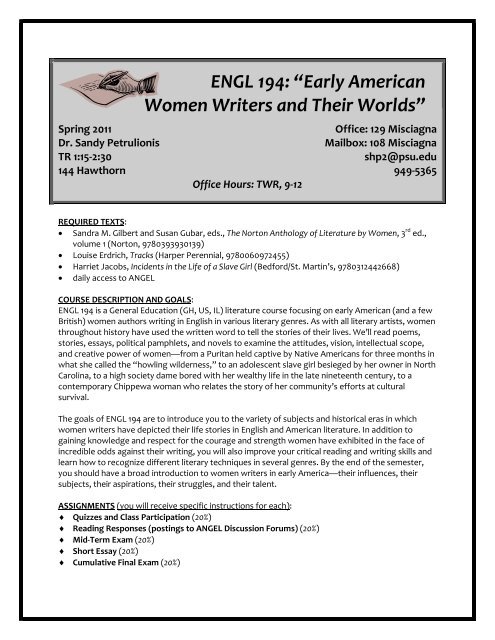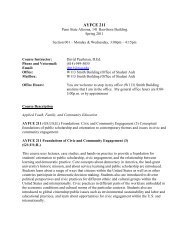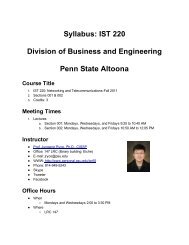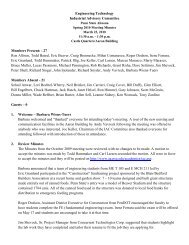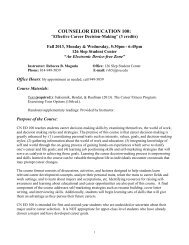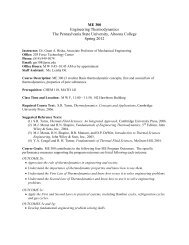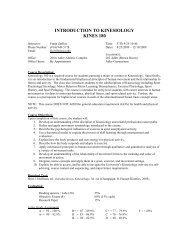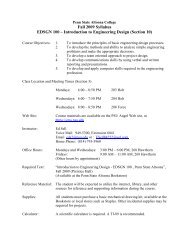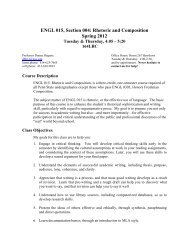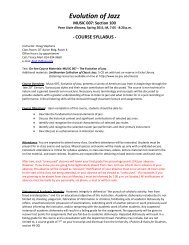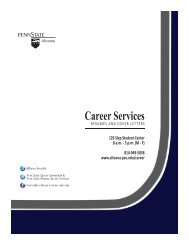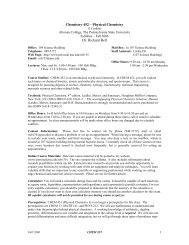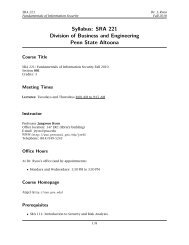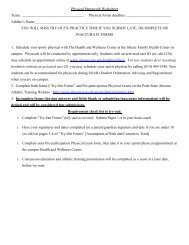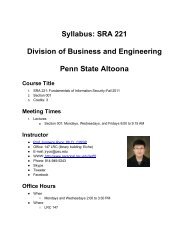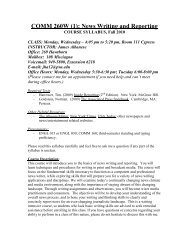ENGL 194 - Penn State Altoona - Penn State University
ENGL 194 - Penn State Altoona - Penn State University
ENGL 194 - Penn State Altoona - Penn State University
You also want an ePaper? Increase the reach of your titles
YUMPU automatically turns print PDFs into web optimized ePapers that Google loves.
<strong>ENGL</strong> <strong>194</strong>: “Early American<br />
Women Writers and Their Worlds”<br />
Spring 2011<br />
Office: 129 Misciagna<br />
Dr. Sandy Petrulionis<br />
Mailbox: 108 Misciagna<br />
TR 1:15-2:30<br />
shp2@psu.edu<br />
144 Hawthorn 949-5365<br />
Office Hours: TWR, 9-12<br />
REQUIRED TEXTS:<br />
• Sandra M. Gilbert and Susan Gubar, eds., The Norton Anthology of Literature by Women, 3 rd ed.,<br />
volume 1 (Norton, 9780393930139)<br />
• Louise Erdrich, Tracks (Harper Perennial, 9780060972455)<br />
• Harriet Jacobs, Incidents in the Life of a Slave Girl (Bedford/St. Martin’s, 9780312442668)<br />
• daily access to ANGEL<br />
COURSE DESCRIPTION AND GOALS:<br />
<strong>ENGL</strong> <strong>194</strong> is a General Education (GH, US, IL) literature course focusing on early American (and a few<br />
British) women authors writing in English in various literary genres. As with all literary artists, women<br />
throughout history have used the written word to tell the stories of their lives. We’ll read poems,<br />
stories, essays, political pamphlets, and novels to examine the attitudes, vision, intellectual scope,<br />
and creative power of women—from a Puritan held captive by Native Americans for three months in<br />
what she called the “howling wilderness,” to an adolescent slave girl besieged by her owner in North<br />
Carolina, to a high society dame bored with her wealthy life in the late nineteenth century, to a<br />
contemporary Chippewa woman who relates the story of her community’s efforts at cultural<br />
survival.<br />
The goals of <strong>ENGL</strong> <strong>194</strong> are to introduce you to the variety of subjects and historical eras in which<br />
women writers have depicted their life stories in English and American literature. In addition to<br />
gaining knowledge and respect for the courage and strength women have exhibited in the face of<br />
incredible odds against their writing, you will also improve your critical reading and writing skills and<br />
learn how to recognize different literary techniques in several genres. By the end of the semester,<br />
you should have a broad introduction to women writers in early America—their influences, their<br />
subjects, their aspirations, their struggles, and their talent.<br />
ASSIGNMENTS (you will receive specific instructions for each):<br />
♦ Quizzes and Class Participation (20%)<br />
♦ Reading Responses (postings to ANGEL Discussion Forums) (20%)<br />
♦ Mid-Term Exam (20%)<br />
♦ Short Essay (20%)<br />
♦ Cumulative Final Exam (20%)
CLASS POLICIES<br />
• Late assignments: Late papers will be dropped a letter grade for each class that they are late and<br />
will not be accepted more than one week after the original due date. Assignments may always be<br />
handed in early—in person or in my mailbox in 108 Misciagna.<br />
• Make-Up Exams: Make-up exams will be given only if you miss class due to a documented<br />
emergency.<br />
• Portable Electronic Devices, Headphones, etc.: A college classroom is not “business as usual.”<br />
Please turn off or mute and place under your desk all cell phones, pagers, beepers, watches, i-<br />
pods, cameras, and any other gadgets that make noise and are distracting. Better yet, leave<br />
them at home or in the car .<br />
• Attendance: You can only benefit from and contribute to class discussion if you’re here. Regular<br />
attendance and class participation are expected if you plan to pass <strong>ENGL</strong> <strong>194</strong>.<br />
• Tardiness: Repeated tardiness is rude to everyone in the class and will reduce your final grade in<br />
<strong>ENGL</strong> <strong>194</strong>.<br />
• Class cancellation: To find out if class has been cancelled, go to ; or to<br />
our class on ANGEL. Note: If the entire campus has been closed for severe weather, it will be<br />
announced at as well as on WPSU radio (106.7 FM).<br />
• Classroom Environment: There are few right and wrong answers in here. A literature classroom<br />
is most rewarding when it centers on probing, thought-provoking discussion. The more you<br />
speak up to share your thoughts about the authors and works we’re reading, the more enriching<br />
everyone’s experience will be. You will not always agree with your classmates—but in such<br />
disagreements we all more closely approach an understanding of the subject and gain insights<br />
into others’ opinions and experiences. In all class discussions, I expect and provide tolerance,<br />
courtesy, and respect. Any student whose behavior is disrespectful or disruptive to me or to<br />
other students will be asked to leave (and perhaps to drop) the class. Your questions are<br />
welcomed and encouraged—in class, during office hours, via e-mail, or telephone. If you don’t<br />
understand or are having trouble with an assignment, or if you just want to discuss something—<br />
please let me know. I’d like to have the chance to suggest a solution before an issue becomes a<br />
problem.<br />
• Students with Disabilities: <strong>Penn</strong> <strong>State</strong> <strong>University</strong> welcomes students with disabilities into its<br />
educational programs. If you have a disability-related need for modifications or reasonable<br />
accommodations in this course, please let me know as soon as possible after you have contacted<br />
the Disability Services office in the Health & Wellness Center, located at the Sheetz Family Health<br />
Center (949-5540; www.altoona.psu.edu/healthwellness).<br />
Grading Scale: Your final grade in this class follows the scale recommended by the university’s<br />
College of Liberal Arts, as shown below. [Note that <strong>Penn</strong> <strong>State</strong> does not allow the option to award<br />
grades of C-, D+ or D-.]<br />
A = 95 to 100<br />
A- = 90 to 94.9<br />
B+ = 87.9 to 89.9<br />
B = 83.33 to 87.8<br />
B- = 80 to 83.32<br />
C+ = 75 to 79.9<br />
C = 70 to 74.9<br />
D = 60 to 69.9<br />
F = 59.9 and below
“A woman must have money and a room of<br />
her own if she is to write fiction.”<br />
---Virginia Woolf<br />
SCHEDULE OF CLASSES (all readings are from The Norton Anthology except for Harriet Jacobs’s<br />
Incidents in the Life of a Slave Girl and Louise Erdrich’s Tracks. Always read the author’s biographical<br />
sketch preceding the assigned texts.)<br />
Week 1<br />
Jan. 11:<br />
Jan. 13:<br />
Introduction<br />
Virginia Woolf: from A Room of One’s Own (handout)<br />
Queen Elizabeth I: “On Monsieur’s Departure”<br />
Weeks 2-3: Puritan Women Writers<br />
Jan. 18: “Literature of the Seventeenth and Eighteenth Centuries” (pp. 123-44)<br />
Anne Hutchinson: “Trial at the Court of Newton, 1637” (handout)<br />
Anne Bradstreet: “The Prologue,” “The Author to Her Book,” “To My Dear and Loving<br />
Husband”<br />
Jan. 20:<br />
Mary Rowlandson: from A Narrative of the Captivity and Restoration of Mrs. Mary<br />
Rowlandson<br />
Lucy Terry: “Bars Fight”<br />
Cotton Mather: “A Notable Exploit: Hannah Dustan’s Captivity and Revenge” (handout)<br />
Jan. 25, 27: Eliza Haywood: Fantomina; or, Love in a Maze<br />
Aphra Behn: “The Willing Mistress”<br />
Weeks 4-5: Revolutionary Women<br />
Feb. 1: Sarah Kemble Knight, from The Private Journal of a Journey from Boston to New York<br />
Abigail Adams: Letters to John Adams<br />
Feb. 3: Phillis Wheatley: “On Being Brought from Africa to America”<br />
Hannah More: from The Slave Trade<br />
Sarah Wentworth Morton: “The African Chief”<br />
Feb. 8: Lady Mary Chudleigh: from The Ladies Defense and “To the Ladies”<br />
Judith Sargent Murray: “On the Equality of the Sexes”<br />
Feb. 10: Mary Wollstonecraft: from A Vindication of the Rights of Women<br />
Week 6:<br />
Feb. 15:<br />
Feb. 17:<br />
An American Movement Begins (or; “that Damned Mob of Scribbling Women”)<br />
Elizabeth Cady Stanton: from “Address to the New York <strong>State</strong> Legislature”<br />
Fanny Fern: “Mrs. Adolphus Smith Sporting the ‘Blue Stocking,’” Mr. Pipkin’s Ideas of<br />
Family Retrenchment,” “A Law More Nice than Just,” “The Working Girls of New York”<br />
Sojourner Truth: “Ain’t I a Woman?”, “Keeping Things Going while Things Are Stirring”<br />
Margaret Fuller: from Woman in the Nineteenth Century<br />
Weeks 7-8: Slave Women Write<br />
Feb. 22, 24: Harriet Jacobs: Incidents in the Life of a Slave Girl<br />
Mar. 1, 3: Finish Incidents<br />
Frances E. W. Harper: “Ethiopia,” “The Slave Mother”<br />
Mid-Term Exam Mar. 3<br />
SPRING BREAK: March 7-11
Week 9: Women Document the Industrial Nightmare<br />
Mar. 15, 17: Rebecca Harding Davis: Life in the Iron Mills<br />
Week 10: More “Scribbling Women”<br />
Mar. 22: Louisa May Alcott: “My Mysterious Mademoiselle,” “How I Went Out to Service”<br />
Mar. 24: Constance Fenimore Woolson: “Miss Grief”<br />
Week 11:<br />
Mar. 29:<br />
Mar. 31:<br />
Week 12:<br />
Apr. 5, 7:<br />
From 1850 to 2011: American Women Poets<br />
Emily Dickinson: “Rearrange a ‘Wife’s’ Affection!”, “I felt a Funeral, in my Brain,” “She<br />
dealt her pretty words like Blades,” “I dwell in Possibility,” “Much Madness is divinest<br />
Sense”<br />
Guest speaker: Poet Shara McCallum from Bucknell <strong>University</strong><br />
Women in the Gilded Age<br />
Kate Chopin: The Awakening<br />
Week 13: Local Color, and Women’s Health and Sexuality<br />
Apr. 12: Mary E. Wilkins Freeman: “The Revolt of ‘Mother’”<br />
Apr. 14: Charlotte Perkins Gilman: “The Yellow Wallpaper”<br />
Short Essay due Apr. 14<br />
Weeks 14-15: A Contemporary Woman’s Voice<br />
Apr. 19, 21: Louise Erdrich, Tracks (through p. XX)<br />
Apr. 26, 28: Finish Tracks<br />
** FINAL EXAM: Thursday, May 5, 2011—3:10 pm-5:00 pm **<br />
-----------------------------------------------------------------------------------<br />
PENN STATE ALTOONA STATEMENT ON ACADEMIC INTEGRITY<br />
[]<br />
“According to <strong>Penn</strong> <strong>State</strong> <strong>University</strong>, Academic integrity is the pursuit of scholarly activity in an open,<br />
honest and responsible manner. Academic integrity is a basic guiding principle for all academic activity<br />
at The <strong>Penn</strong>sylvania <strong>State</strong> <strong>University</strong>, and all members of the <strong>University</strong> community are expected to<br />
act in accordance with this principle.<br />
Academic integrity includes a commitment not to engage in or tolerate acts of falsification,<br />
misrepresentation or deception. Such acts of dishonesty violate the fundamental ethical principles of<br />
the <strong>University</strong> community and compromise the worth of work completed by others.”<br />
Following are all examples of plagiarism:<br />
• submitting work as your own that you did not write (even a sentence!)<br />
• failing to document your research sources<br />
• failing to use quotation marks to indicate words that are directly quoted from any source (in<br />
other words, any words that you did not write must be contained in quotation marks).<br />
We all know that Internet sources have made it very easy and (perhaps) tempting to plagiarize.<br />
** But before you decide to engage in academic dishonesty in <strong>ENGL</strong> <strong>194</strong>, carefully assess the risk<br />
you take**: Any student in this class who engages in academic dishonesty will fail the course, will<br />
be reported to Academic Affairs, and may be suspended from <strong>Penn</strong> <strong>State</strong> <strong>Altoona</strong>.


